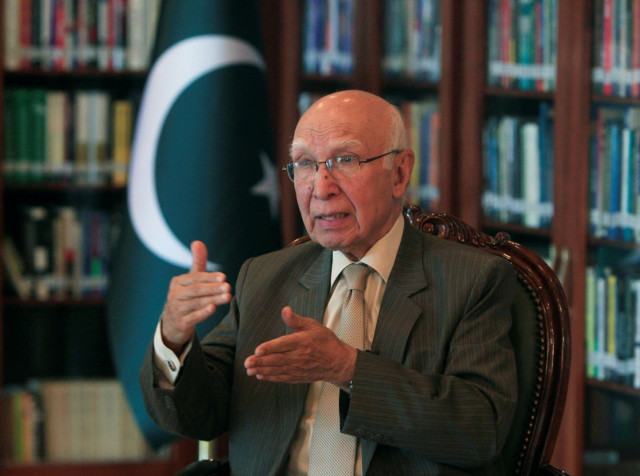Pakistan’s energy efficiency is not encouraging: Aziz
Govt pursuing integrated energy planning to achieve self-sufficiency

Planning Commission Chairman Sartaj Aziz. PHOTO: Reuters
Chairing first meeting of a steering committee, Aziz said its implementation could be ensured by pursuing policies and plans that were affordable and sustainable.
Pakistan’s solution to the energy crisis
The preliminary session of the steering committee was also attended by US Ambassador David Hale.
Aziz emphasised that support for the integrated energy planning was one of the components of the ongoing collaboration between Pakistan and the US in the energy sector.
To streamline the integrated energy planning, the government has constituted the steering committee under the chairmanship of the Planning Commission deputy chairman. Secretaries of the Ministry of Planning, Development and Reform, Power, Petroleum and Natural Resources, and Economic Affairs Divisions are its members.
In his opening remarks at the meeting, Aziz stated that Pakistan’s current access to electricity and clean fuel (gas) was estimated at 62% and 25% respectively while the energy efficiency ratio was not encouraging.
The energy efficiency potential in the power sector alone, however, is estimated at around 3,500 megawatts. “In order to provide 100% energy access to the growing population and meet the country’s economic development targets, a long-term integrated energy planning approach is required,” he said.
Pakistan has ‘2.9 million MW solar energy potential’
“This warrants an energy mix plan which covers both energy supply and increased efficiency in meeting the demand,” he said, adding Pakistan’s current primary energy supply mix was heavily dependent on imported oil (43%), followed by fast depleting locally produced natural gas (36%) and hydroelectric power (13%).
Published in The Express Tribune, September 19th, 2017.
Like Business on Facebook, follow @TribuneBiz on Twitter to stay informed and join in the conversation.


















COMMENTS
Comments are moderated and generally will be posted if they are on-topic and not abusive.
For more information, please see our Comments FAQ